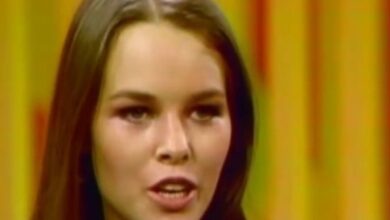Heart Brings Led Zeppelin to Tears with a Powerful “Stairway to Heaven” Performance at the Kennedy Center Honors
When Heart walked onto the Kennedy Center Honors stage in 2012 to pay homage to Led Zeppelin, few in attendance could have imagined the profound impact about to unfold. Ann and Nancy Wilson, supported by a full orchestra, a gospel choir, and Jason Bonham on drums, delivered a version of “Stairway to Heaven” that managed to honor the original while also reshaping it into a transcendent new experience. Their performance resonated not as a simple cover but as a soulful reinterpretation of a song long treated as untouchable.
The atmosphere inside the hall was electric with anticipation. Among the audience were not only prominent figures like President Barack Obama and First Lady Michelle Obama, but also icons spanning music, film, and politics. As Ann Wilson’s voice carried the opening lines, the room hushed completely. The silence was reverent, not passive—charged with awe as her vocals cut through with clarity and emotional depth, leaving everyone present suspended in the moment.
Nancy Wilson later explained how she prepared herself backstage before walking out, visualizing a bowl of water cradled in her hands. That metaphor of balance and calm under pressure shaped her stage presence, translating into an aura of composure and grace. When Ann released her first vocal note, it felt like the collective breath of the entire audience had been exhaled at once, uniting everyone in a shared, almost spiritual release of emotion.
Jason Bonham brought more than just technical expertise to the performance. As the son of John Bonham, Led Zeppelin’s late and legendary drummer, every beat carried a connection to his father’s legacy. His drumming wasn’t about imitation; it was about reverence. Each cymbal strike and steady rhythm carried an emotional weight that tethered the performance to the band’s history. It was a poignant reminder that this tribute was as much about lineage as it was about music.
Midway through the piece, the stage transformed as a gospel choir entered, bowler hats on their heads as a nod to John Bonham’s trademark style. Their voices layered with the Wilsons’, lifting the piece into an otherworldly crescendo. What began as a rock ballad grew into a hymn of transcendence, a collective offering that pushed the song beyond its roots. The choir’s entrance turned the moment from a performance into a near-spiritual awakening that visibly moved the audience to tears.
Robert Plant, who has often been hesitant to embrace covers of Zeppelin’s catalog, could not hold back his emotions. Caught on camera mouthing “Wow” and wiping away tears, Plant seemed overwhelmed. Later he confessed that years of hearing weak renditions had distanced him from “Stairway to Heaven,” but Heart’s version reignited his connection. Jimmy Page and John Paul Jones, seated beside him, were equally taken aback, visibly stunned by the depth of what they had just witnessed.
What struck Plant most was not flawless execution, but raw sincerity. Watching two women reinterpret the song with authenticity and vulnerability, backed by musicians who understood its essence, allowed him to rediscover its original soul. It wasn’t a relic of the past anymore—it was breathing, alive, and relevant again, even for those who had performed it countless times before.
Nancy Wilson would later joke, “Try playing ‘Stairway’ with freezing hands in front of Jimmy Page.” The challenge was immense, but the musicians rose to it. Guitarist Shane Fontayne carried perhaps the most daunting task—recreating Page’s iconic solo. He delivered with precision and individuality, capturing the essence without mere duplication. Page himself reportedly offered rare, heartfelt praise, telling him, “You nailed it,” validating the courage and artistry required for such a performance.
The broadcast spread quickly, reaching millions in a matter of hours. Viewers who had never seen Heart live, or even considered themselves Zeppelin fans, found themselves captivated. The performance resonated not because of spectacle but because of authenticity. It reminded audiences everywhere of the transformative power of music—its ability to heal, to inspire, and to connect people across generations and genres in ways that defy explanation.
Ann Wilson would later describe singing that night as euphoric, as though she became the vessel for the song’s emotion itself. She wasn’t simply performing; she was embodying the story. Kennedy Center staff, accustomed to witnessing historic performances, admitted to being reduced to tears. The rawness and sincerity of the Wilson sisters, fused with reverence for Zeppelin’s legacy, created a moment that felt singular and unrepeatable.
After the performance, Plant reportedly approached the Wilson sisters with heartfelt gratitude, saying it was the first time he had truly heard the song honored in the way it was meant. Jimmy Page echoed his sentiment, noting how rare it was to witness such depth and integrity in a reinterpretation. Their acknowledgment wasn’t mere politeness; it was a genuine recognition of artistry that had touched them deeply.
Heart’s rendition did more than commemorate a legendary band; it redefined one of rock’s most iconic songs as a living, breathing work of art. It introduced younger generations to the power of “Stairway to Heaven,” while rekindling passion for those who had lived with it for decades. It transcended eras, gender roles, and the very boundaries of genre, standing as a shining example of how tribute can become timeless creation in its own right.
Even more than a decade later, this performance stands as the benchmark for tribute concerts. It was not just a faithful recreation but a daring reinvention steeped in reverence. That evening at the Kennedy Center, Heart reminded the world that legendary music should not be preserved in stillness—it should be lived, reimagined, and passed on through fearless performances filled with love and respect.





